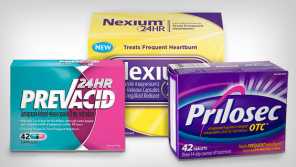Heartburn Drugs might be linked to Dementia, study claims - Healthier options
On ABC news and other media there is talk about a new study published in the Journal of America Medical Association Neurology that claims that heartburn drugs are linked to dimentia. The study focused on proton pump inhibitors (PPIs) drugs such as Prevacid, Nexium, and Prilosec, that work by lowering the amount of acid produced by the stomach.
German researchers examined the medical records of more than 73,000 patients ages 75 and older and found that long term users of the drugs were 44 percent more likely to develop dementia.
While the study found a link, it did not prove that the drugs actually caused dementia.(via ABC News "HEARTBURN DRUGS LINKED TO DEMENTIA, STUDY CLAIMS")
The study's authors does make it clear that it is not a definitive cause-effect:
"To evaluate cause-and-effect relationships between long-term PPI use and possible effects on cognition in the elderly, randomized, prospective clinical trials are needed," said corresponding author Britta Haenisch, from the German Center for Neurodegenerative Diseases in Bonn.
In the meantime, "Clinicians should follow guidelines for PPI prescription, to avoid overprescribing PPIs and inappropriate use," Haenisch said.
(via CBS News "Popular heartburn drugs linked to risk of dementia")
So there is no causal link proved - that would be harder to prove. But it should be noted that the packages of heartburn drugs are labelled with the instructions to use the medication for up to 14 days - so short term use - or seek the advise of a physician. ABC's Dr. Richard Besser pointed this out in the discussion, as well as the other better healthier options to deal with heartburn and prevent it - losing weight if you are overweight, put your head up higher when you are sleeping (either add more pillows or you can also raise the head of your bed), and finding out what food triggers your heartburn, such as acidic or spicy foods.
Actually diet and weight are on their own also risk factors for developing cognitive issues later in life, as explained by Keith Fargo, director of scientific programs and outreach for the Alzheimer's Association:
"It does not tell us anything that should change medical practice right now," Fargo said. "I don't think there's going to be an uprising among doctors telling patients not to take their PPIs. This doesn't rise anywhere near the level of evidence you would need for that."
One of the paper's main flaws is that researchers could not control for diet and body weight as risk factors, Fargo said.
"Both of those things, we know, are risk factors for developing cognitive decline and dementia in later life, and both of those are reasons why a person might need to take a proton pump inhibitor," Fargo explained.
(via CBS News "Popular heartburn drugs linked to risk of dementia")



 Report a concern
Report a concern

 Add Comment
Add Comment



